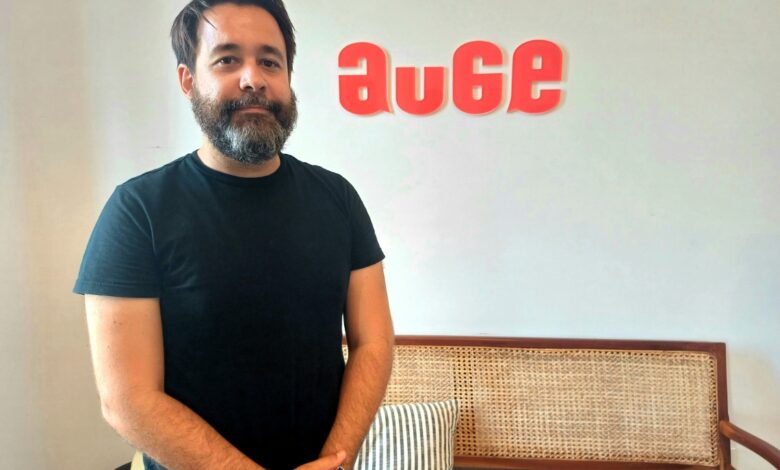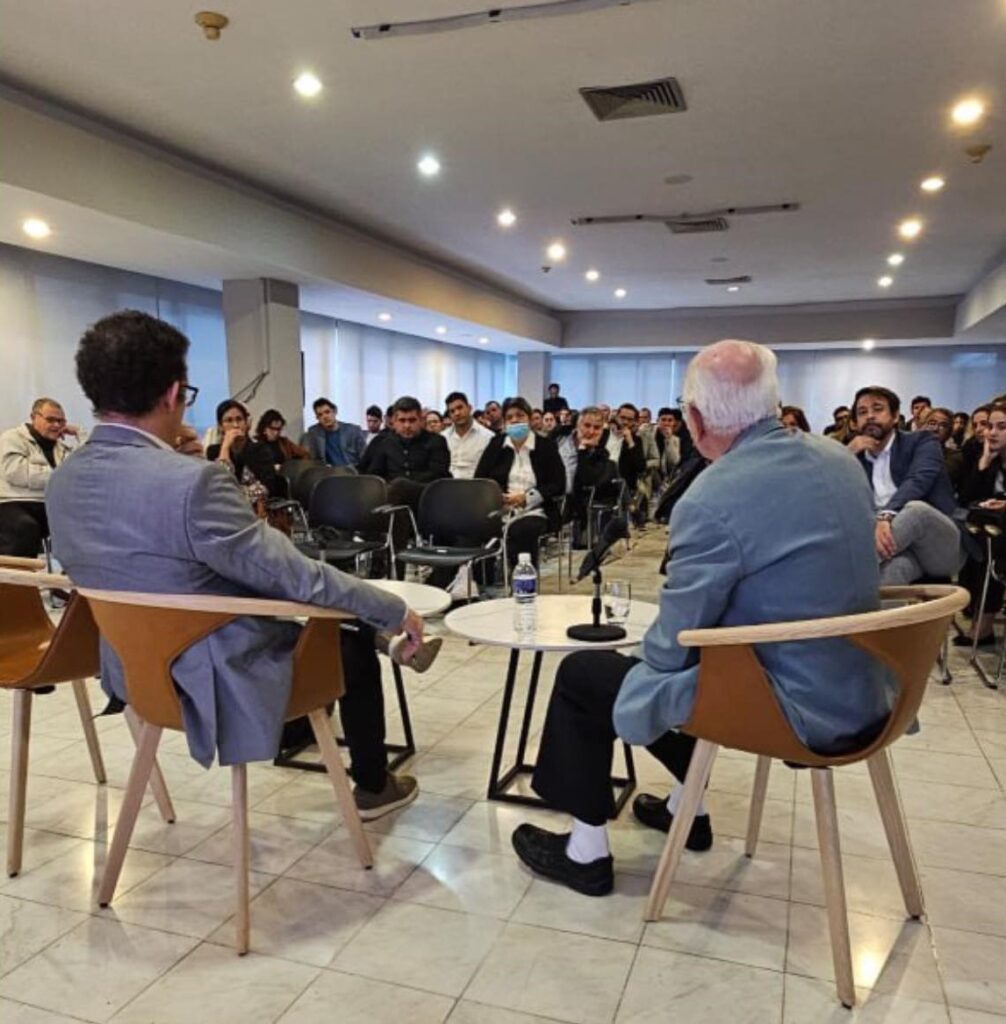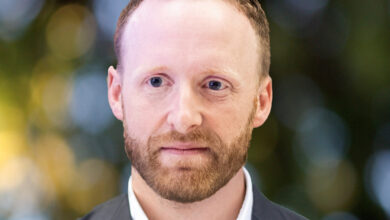Oniel Díaz, manager of AUGE: “We have private enterprises, we need entrepreneurs”

AUGE, a private corporate services enterprise, has been taking the pulse of the Cuban economy since its founders, Oniel Díaz and Lyly Díaz, created the enterprise in 2014, then as self-employed workers.
In recent years, AUGE has held events to dialogue with entrepreneurs, academia and other parties interested in the performance of MSMEs, which have suffered a significant impact by the economic crisis.
Now they are focused on what private sector owners and workers can do to survive and be successful, despite the obstacles. Reactor 360, the event they convened for next June 6, will be an introspective look at business management.
Regarding the event, OnCuba spoke with the general manager of AUGE, Oniel Díaz.
What is Reactor 360? Why convene an event like this?
Since 2021, the country’s business sector has been diversifying. There is a multiplicity of actors with different forms of ownership. The private sector has expanded into areas that were banned by existing regulations. All this has generated a dynamic transformation of the economy, in the midst of a crisis.
There are already private enterprises in Cuba, but there is a need for entrepreneurs. There are enterprises, but we have to learn to manage them, guide them and lead them.
Reactor 360 wants to focus on this. It is an event for businesspeople to debate on management issues. Planning, strategies and human resources will be the pillars of these discussions.
The event does not intend to explain the problems of the economy, which affect a great deal. We want to focus on what internal factors depends on. In many enterprises, both success and failure have been determined by the expertise, capacity, intelligence and method of the people who lead them and make up those teams. That’s where we want to look.
The call is open to all types of businesses. You can register by mail. Although AUGE events are mainly attended by private sector businesspeople, we have received foreign businesspeople based in Cuba, investors in the Mariel Special Development Zone (ZEDM), some public institutions and state enterprises.
Why do you affirm that there are private enterprises in Cuba, but there is a need for entrepreneurs?
When we started, entrepreneurs did not pay attention to important issues such as personnel, organization or growth strategies; essentially because there was no competition, there was no diversity in the market.
Ten years ago it was only about investing money, creating a business, offering goods and services in deficit in the national economy, because people were going to pay for it no matter what. But, as competition expanded and the market became more complex with different players, it became necessary to think about how to run an enterprise with a method and a defined structure.
In the last three years there has been a rapid increase in private enterprises, but the growth in knowledge, capacity and know-how has not shown the same speed. We want to give that same intensity to the development of skills to run enterprises and carry out productive or service projects.

Is this reality different in the state sector?
There are state-run enterprises with solid corporate knowledge. We can mention those that manage the country’s main export products, joint ventures with the participation of foreign capital. Both foreigners and national managers have demonstrated the capacity.
Furthermore, the Cuban biotechnology or tourism system can be pointed out as a reference in business issues. There are good references of corporate culture where it has been forced to be competitive to meet demands in a changing market, export or compete internationally.
However, there is a part of the public sector in which there are deficiencies in this field.
MSMEs and state enterprises: a combination to achieve success?
I don’t focus the deficiencies on who owns the enterprise. The insufficiencies in the service culture, being slow to react to market signals, as well as deficiencies in image and communication, are not exclusive to the state or private sector. These are issues that have to be completely improved in the national business sector because the Cuban economy is one.
However, the private sector is increasingly gaining more attractiveness among professionals. Today it concentrates more than 35% of the workforce. There is talk of a professional migration towards this sector. Has this had any impact on the corporate management of MSMEs?
Unfortunately, what is actually happening is that many people are leaving the country. We have discussed it among colleagues. Somehow, the private sector ends up being the last stop before many workers and professionals leave. They leave their jobs in the public sector, they come to the private sector; but still, after a year or two, many of them end up emigrating and channeling their life plans outside of Cuba.
The private sector does not escape this silent bleeding. When private entrepreneurs speak about what affects them most, they insist that this immigration situation creates a great problem for consolidating a team, strengthening internal capabilities and establishing a replicable and sustained work method.
What other challenges have you identified during AUGE corporate events?
The events have helped us build a collective intelligence to understand how the various economic actors are facing problems such as the emigration of the workforce, inflation, the sustained loss of the value of the Cuban peso and gaps in the regulatory framework under which we operate.
At our last event, Quorum, a meeting we held in February between business leaders to discuss the economic situation, we generated an executive summary. In that text we reviewed all the important discussions and shared it through social media. It was read by thousands of businesspeople and interested people. It is still available online.


Considering what you mention, is it right to blame the MSMEs for the current crisis?
The private sector is not responsible for the long-standing structural problems of the national economy. These respond to profound deficiencies, such as the lack of production and investment in appropriate activities, the need to manage the macroeconomy more efficiently and also the impact of the United States government sanctions on Cuba. In no way can MSMEs be the cause of this.
I observe critical opinions about MSMEs without being alarmed. It is normal and expected in a country like Cuba, which for decades had an economic structure completely different from the current one.
I understand that a significant part of the population is seriously limited in their income and that meeting their needs in the private sector can be difficult, when the public sector cannot guarantee what it has provided them all their lives.
Pensions vs. exchange rate in Cuba: the urgent need to put a stop to inflation
There are also valid opinions, especially those related to fiscal discipline and respect for employees’ labor rights. There is a lot to organize and build with the participation of both sides: the State and the private sector.
However, the solution to these problems cannot be labeling, baseless accusations and questioning the private sector. Ultimately, the latter exists in Cuba by decision of the country’s political leadership and is recognized in the Constitution and the laws.
The solution to these macroeconomic problems involves a profound transformation of the economy and, with regard to the private sector, applying a fair balance of regulation and promotion policies.
There is criticism of MSMEs also from outside Cuba. It is said that private enterprises are a kind of government front.
It’s a gigantic lie. Saying that private enterprises in Cuba are a government front or a public relations operation by the Cuban authorities to hide their failures is completely false. There are thousands of people who work in the private sector and thousands of enterprises that have been approved. Any fairly serious calculation that considers these numbers disproves that accusation.
In my opinion, this is an assertion for political purposes, which seeks to discredit the Cuban government and this specific decision. The voices that support this type of criticism are the same ones that for decades have supported the blockade against Cuba, sanctions that have affected the economy, Cuban citizens and families. This is nothing more than an attempt to erode this light in the national economy, which is giving obvious results and which to some extent is contributing to the solution of the problems.
These opinions have apparently found receptive ears in the Biden administration. Campaign promises that benefited the private sector have not been fulfilled. Are MSMEs not impacted by the blockade?
The sanctions impact the entire Cuban economy because it is just one. When the country cannot access fuel or pay under international financial mechanisms, or when state enterprises are sanctioned or prevented from participating in some type of transaction, these sanctions have a spillover effect to the private sector. For example, we buy electricity from state-owned enterprises, and if they are affected as a result of sanctions, the negative impact is passed on.
Money transfers that mention Cuba become problematic. Private enterprises are beginning to intensively use the international financial sector due to the complications of the Cuban exchange market. We know of clients who have had problems moving their financial resources out of the country because, ultimately, they are a Cuban legal entity and the banks strictly apply the economic sanctions established for Cuba to them.
The sanctions have exceptions that allow U.S. companies to sell to private Cuban enterprises. This is what has been happening in the last two years. But, regardless of these possibilities, when the time comes to carry out an operation, backed by a bank transaction and in the middle is the word “Cuba” or there are resources that move to or from the country, the blockade comes to play its role.
Returning to what can be done, without the mediation of external factors, what entrepreneurs does Cuba need to face these difficulties?
We need entrepreneurs committed to the long term, who create projects that impact the development of the country and improve the availability of services and products. Entrepreneurs with a social conscience, who respect the labor rights of their employees, and who are efficient and capable of leading their enterprises with high levels of innovation and effort. That they keep in mind that business success in Cuba should not be based solely on the cold calculation of numbers, but also on contributing to the development of the country and helping to get out of the crisis.
In what you mention, corporate social responsibility is of fundamental importance….
Corporate social responsibility must be a distinctive element of the Cuban private sector.
We firmly believe in these values, which are not just in books, but are established in a large part of the country’s business community. There are private businesses that support communities and sectors of the population on a small scale, and even public institutions in the fulfillment of their social function.
The responsibility of private enterprises in Cuba today should go through three focal points:
First, contribute to the economic development of the country. In our business analyzes we must try to tally business opportunities with projects that benefit Cuba’s development, strengthen our economy and help us get out of the crisis.
Second, respect the labor rights of workers. It is very commendable to be environmentally responsible, but first and foremost we must respect the labor rights of workers, without nuances.
Third, the payment of taxes. This is a subject of much discussion. Nobody likes paying taxes, but there is a lack of information and transparency about how they are used.
It could be argued whether the tax base used today for small businesses is fair or not. But it is indisputable that taxes must be paid. Furthermore, those who do not pay compete on an unfair basis with those who do.
How does AUGE plan to contribute to this change in thinking?
Business sciences are highly developed and there is a high theoretical and practical level in the world. Cuba is several steps behind for various reasons, including the economic system that has been operating here for many years.
Although we have to look at foreign experiences and be abreast of the latest trends, we cannot be dazzled by things that are inapplicable here, no matter how attractive they may be. Nor can we renounce them because we think that we are in a unique place where nothing invented outside applies. It may seem like a contradiction, but it is not.
The ability to choose and understand the best global practices that can be implemented in Cuba, combined with our ten years of experience in managing small and medium-sized private businesses, is the value that AUGE intends to provide.



